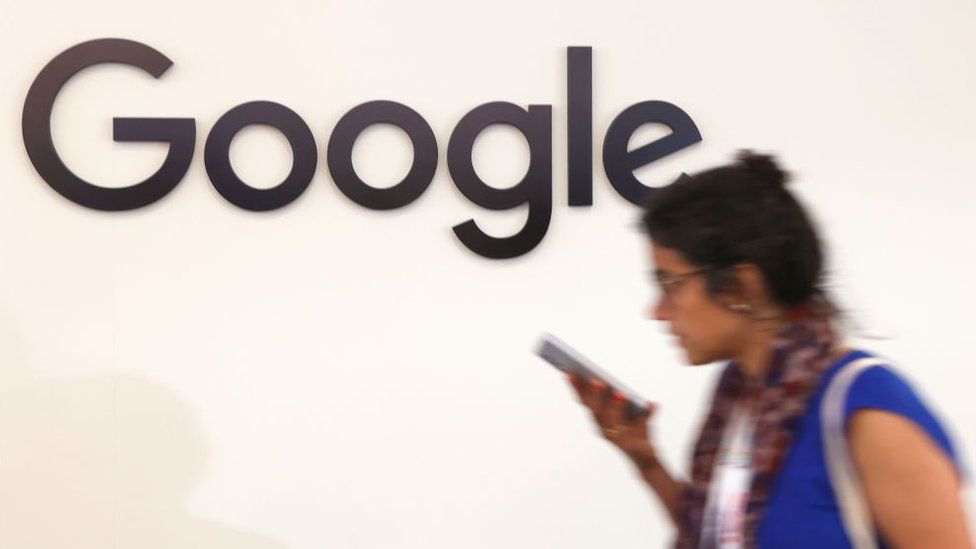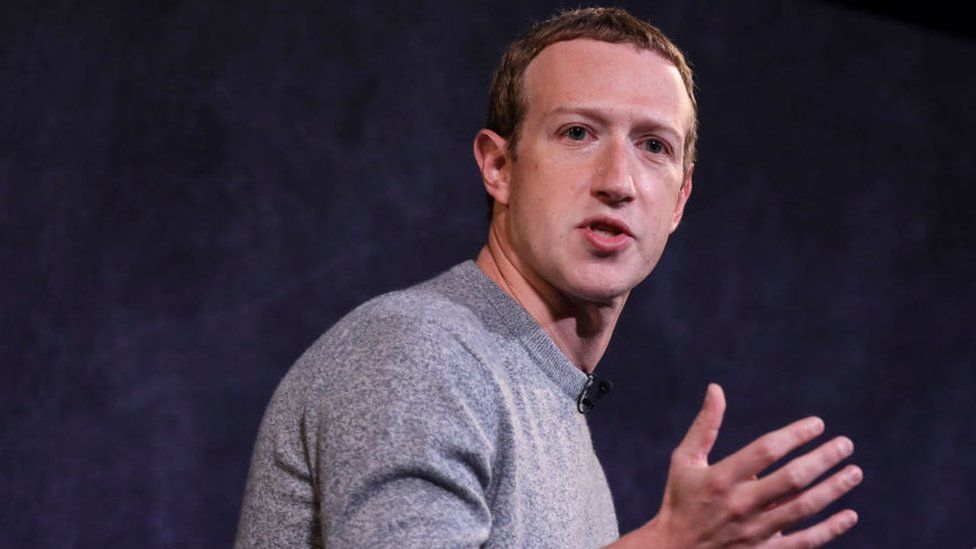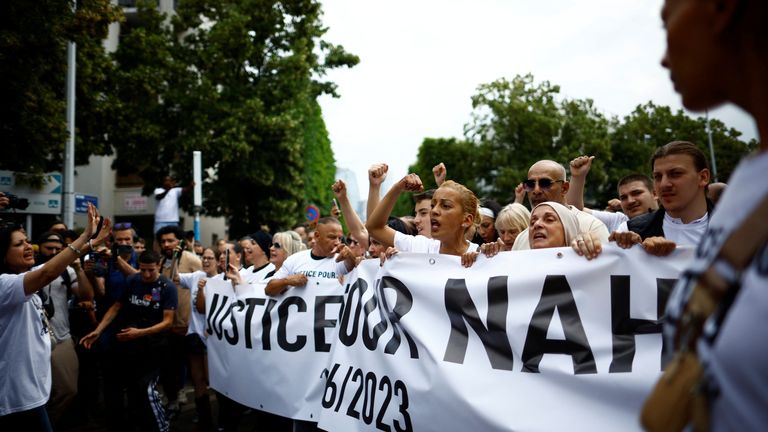Can Canada make big tech pay for news?
 GETTY IMAGES
GETTY IMAGESMeta, owner of Facebook and Instagram, and Google say they will block local news from their platforms in Canada after the country became the latest jurisdiction to pass a law aimed at forcing tech giants to pay news providers for content. What happens now?
As president of La Presse, a leading French-language publication in Quebec, Pierre-Elliott Levasseur says he tried for years to negotiate payment agreements with tech giants, which he believed were sucking up data and ad dollars on the strength of news articles his 220-odd staff were supplying.
"For years and years they've flat-out refused," he told the BBC.
He had hoped a new law, known as the Online News Act, would change that - and lead to an influx of funds that could be invested in the business.
The law - which is aimed at Google and Meta - requires tech firms to negotiate payment agreements with news outlets. If the two sides cannot reach a deal, the country's broadcast regulator can force them into arbitration.
A independent parliamentary budget watchdog has estimated that measure could generate more than C$300m (£180m; $226m) in total annually - or funding for roughly 30% of a typical newsroom's operations.
But instead of a windfall, La Presse - and every other Canadian news organisation - is now facing a potential blackout, as the tech giants pledge to block links to news articles on their platform rather than comply.
Meta, which had opposed the proposal from the start, said it would start blocking news sites for Canadian users over the next few months.
Google has struck payment agreements with news providers in Europe, Australia and elsewhere and had appeared willing to negotiate.
But this week it called Canada's current law "unworkable" and said it would remove links to Canadian news from its search, news and discover products in the country once the act goes into effect in six months.
It says it currently has agreements with over 150 Canadian news organisations, and estimated its traffic helped news websites earn C$250m a year.
"We're willing to do more," the company said referring to payments. "We just can't do it in a way that breaks the way that the web and search engines are designed to work, and that creates untenable product and financial uncertainty."
Before the law was passed this month, Prime Minister Justin Trudeau had dismissed the threats from the tech firms to pull news.
 LA PRESSE
LA PRESSE"The fact that these internet giants would rather cut off Canadians' access to local news than pay their fair share is a real problem, and now they're resorting to bullying tactics to try and get their way. It's not going to work," he said earlier in June.
Tech industry organisations have compared the effort to a "shakedown", but Mr Levasseur says no one in media is looking for a handout.
"We're asking to have an opportunity to negotiate a fair commercial agreement," he says. "The only reason that they haven't done it is because they're monopolies."
How the dispute gets resolved could prove a pivotal moment in a wider fight, as countries around the world, including Indonesia, South Africa, India, the UK and the US consider similar measures.
The sums under discussion amount to a tiny drop in the bucket compared to the tens of billions of dollars made by the tech giants each year - but could prove a lifeline for journalism, says Courtney Radsch, director of the Center for Journalism and Liberty at the Open Markets Institute, an anti-monopoly think-tank.
"There is an increasing consensus around the world that Google and Facebook ... should pay for the news that they use," she says. "People realise that there is a need to protect journalism as a fundamental pillar of democracy."
Canada modelled its rule on a measure that Australia passed in 2021. That law sparked similar objections, prompting Meta to impose a brief news blackout.
But after some changes to the bill the two companies ended up negotiating more than 30 deals with publishers worth more than $130m (A$200m), according to economist Rodney Sims, who led Australia's competition agency, which developed the law.
He says he expects the companies to behave similarly this time - even though at Meta, CEO Mark Zuckerberg has been pushing the platform away from news in favour of more personal content.
"Facebook just hates the whole thing," he conceded. But "you can't have effective search with no news and I think Facebook is going to find ... that it is very hard for them to give you your feed without any news," he says.
"It's what makes their service complete."
But others a warning that how the fight plays out in Canada could be different.
 GETTY IMAGES
GETTY IMAGESPhillip Crawley, chief executive of the Globe and Mail, which has licencing deals in place with Google, Meta, Apple and others, pointed to broader changes in search that are under way, such as the rise of chatbots like ChatGPT, which generate answers, not a list of links, in response to user questions.
With more countries considering such measures, the companies also have bigger incentive to fight, he says.
"The world is in a different place," says Mr Crawley, who spoke in support of the bill while raising concerns that certain powers granted Canada's broadcast regulator could threaten independence of the press.
"So I don't think the model in Australia is one that that we should be guided by too much. That was then. This is now."
Google and Meta say that Canada's law differs from Australia's in key ways. Notably, in Australia, companies could satisfy regulators without doing deals with everyone. In Canada, there's no such out. It also regulates more types of content.
Google says it tried - with little effect - to raise its concerns about the bill with the government before it passed. Though the government came back to the bargaining table after the law passed, those "overtime" discussions were too late to fix the problems, a source at the company told the BBC.
Michael Geist, a Canadian tech legal scholar and noted critic of the bill, says the government has miscalculated given the shifts in Meta's business.
The company has said the proportion of adults using Facebook for news fell by about a third between 2016-2022, from 45% to 30%, and its surveys of users show they want to see less news on the platform.
"Why did the government not read the room?" Mr Geist said. "Facebook is not bluffing - they would like to get out of news."
Google has said it will continue to participate in the regulatory process, which could take months to resolve and leaves many newsrooms facing more turmoil.
At the Globe and Mail, which now gets two-thirds of its revenue from subscriptions, Google accounts for 30% of the traffic, Mr Crawley told parliament last month.
For Le Devoir, a major French-language publication, Google drives 40% of its traffic and nearly 30% comes from social media.
Meta has already moved to cancel the deals it has in place with publishers in Canada - which can be worth millions of dollars, according to reports - as well as a funding it had provided to a fellowship programme.
Mr Levasseur conceded that a blackout would have an impact at La Presse, which is profitable and funded largely by advertising and reader donations. But he said he believed the publication, which reaches roughly 1.4 million readers each day, would adjust, as it has to the other upheavals in the news business that tech giants have unleashed.
"When we put an end to the [print] paper, advertising revenue was decreasing. Now it's increasing," he says. "We were able to adjust then and I'm sure we'll be able to adjust in the future."
US tech giant says new Canadian law requiring online platforms to pay news publishers ‘remains unworkable’.

Published On 29 Jun 2023

















:quality(70)/cloudfront-eu-central-1.images.arcpublishing.com/thenational/7JKCQTVLZN3UCMAX67PVVP73CE.jpg)
:quality(70)/cloudfront-eu-central-1.images.arcpublishing.com/thenational/NJIAWSBCSAO2LMZHMXJBZR4ALY.jpg)
:quality(70)/cloudfront-eu-central-1.images.arcpublishing.com/thenational/NDCEHIG6NDMRPLK2NCALWKXP4M.jpg)
:quality(70)/cloudfront-eu-central-1.images.arcpublishing.com/thenational/XN6VR2BKCBZVITLUZU4MENIWNY.jpg)
:quality(70)/cloudfront-eu-central-1.images.arcpublishing.com/thenational/47RUANEREKPBUPFYYKY5REZEEI.jpg)
:quality(70)/cloudfront-eu-central-1.images.arcpublishing.com/thenational/BFJNZ3AZEXWUYDISBYMGPKWI4Q.jpg)
:quality(70)/cloudfront-eu-central-1.images.arcpublishing.com/thenational/C52LNO7GYSAQQFFKLOCIP7ZHOY.jpg)
:quality(70)/cloudfront-eu-central-1.images.arcpublishing.com/thenational/AIDCEQF4KLG5AHZXOFYUYL5USM.jpg)
:quality(70)/cloudfront-eu-central-1.images.arcpublishing.com/thenational/XJARTZOW53KCXPUR4ZVXGELDGI.jpg)
